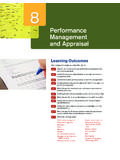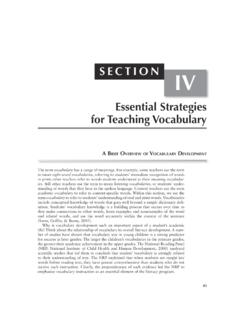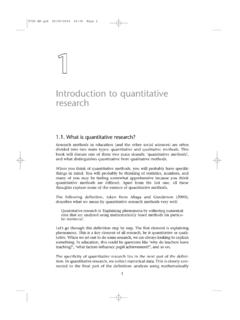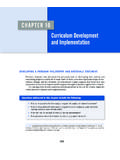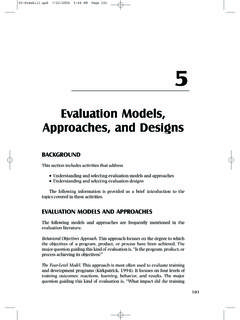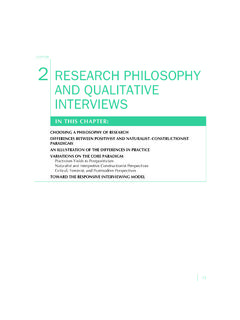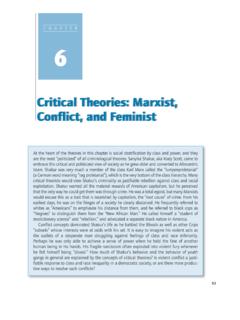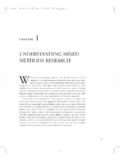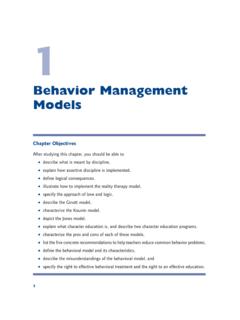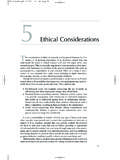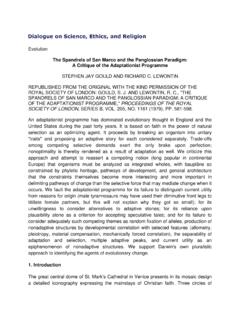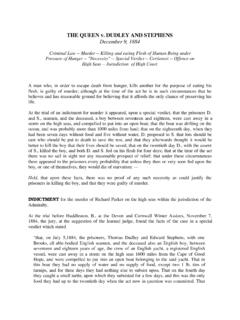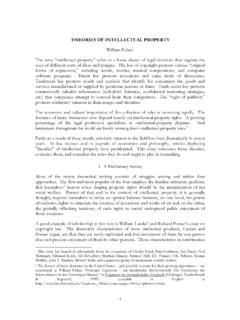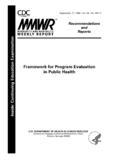Transcription of What Is Action Research? - SAGE Publications Inc
1 ONEWhat Is Action Research? The Action research family is wide and diverse, so inevitably different people say different things about what Action research is and what it is for, and who can do it and how. You need to know about these issues, so you can take an active part in the debates. Taking part also helps you appreciate why you should do Action research and what you can hope to chapter is organized into four sections that deal with these what Action research is and is not2 Different approaches to Action research3 Purposes of Action research4 When and when not to use Action research1 what Action research is and is notAction research is a form of enquiry that enables practitioners in every job and walk of life to investigate and evaluate their work. They ask, what am I doing?
2 Do I need to improve anything? If so, what ? How do I improve it? They produce their accounts of practice to show: (1) how they are trying to improve what they are doing, which involves first thinking about and learning how to do it better; and (2) how they try to influence others to do the same thing. These accounts stand as their own practical theories of practice, from which others can learn if they research has become increasingly popular around the world as a form of professional learning. It has been particularly well developed in education, specifi-cally in teaching, but is now used widely across the professions. A major attraction of Action research is that everyone can do it, so it is for ordinary practitioners as well as principals, managers and administrators. Students also can and should do Action research (McNiff, 2010a; see also page XX of this book).
3 You can gain university accreditation for your Action enquiries, as the case studies in this book 720/01/2011 9:49:13 AM8 ALL YOU NEED TO KNOW ABOUT Action RESEARCHA ction research can be a powerfully liberating form of professional enquiry because it means that practitioners themselves investigate their practices as they find ways to live more fully in the direction of their educational values. They are not told what to do. They decide for themselves what to do, in negotiation with others. This can work in relation to individual as well as collective enquiries. More and more groups of practitioners are getting together to investigate their collec-tive work and put their stories of learning into the public domain. Your story can add to this collection and strengthen is what makes Action research distinctive.
4 Practitioners research their own practices, which is different from traditional forms of social science research , where a professional researcher does research on practitioners. Social scientists tend to stand outside a situation and ask, what are those people over there doing? How do we understand and explain what they are doing? This kind of research is often called outsider or spectator research . Action researchers, however, are insider researchers. They see themselves as part of the context they are investigating, and ask, individually and collectively, Is my/our work going as we wish? How do we improve it where necessary? If they feel their work is already reasonably satisfac-tory, they evaluate it and produce evidence to show why they believe this to be the case.
5 If they feel something needs improving, they work on that aspect, keep-ing records and producing regular oral and written progress reports about what they are are some examples of social science (outsider) questions and Action research (insider) questions to show the difference between science (outsider) questions vWhat is the relationship between nurses practice-based knowledge and the quality of patient care? vDoes management style influence worker productivity? vWill a different seating arrangement increase audience participation? Action research (insider) questions vHow do I study my nursing practice for the benefit of the patients? vHow do I improve my management style to encourage productivity? vHow do I encourage greater audience participation through trying out different seating arrangements?
6 Action research aims to be a disciplined, systematic process. A notional Action plan is: vtake stock of what is going on; videntify a concern; vthink of a possible way forward; 820/01/2011 9:49:13 AM what IS Action research ? 9 vtry it out; vmonitor the Action by gathering data to show what is happening; vevaluate progress by establishing procedures for making judgements about what is happening; vtest the validity of claims to knowledge; vmodify practice in light of the evaluation. (This is a modified version of the plan in McNiff and Whitehead, 2010)reflectactevaluatemodifyMove in new directionsobserveFigure An Action reflection cycleThis can be turned into a set of questions, as follows: vWhat is my concern? vWhy am I concerned? vHow do I show the situation as it is and as it develops?
7 VWhat can I do about it? what will I do about it? vHow do I test the validity of my claims to knowledge? vHow do I check that any conclusions I come to are reasonably fair and accurate? vHow do I modify my ideas and practices in light of the evaluation? (Adapted from Whitehead, 1989)In practical terms, this means you would identify a particular concern, try out a different way of doing things, reflect on what was happening, check out any 920/01/2011 9:49:15 AM10 ALL YOU NEED TO KNOW ABOUT Action RESEARCHnew understandings with others, and in light of your reflections try a different way that may or may not be more successful. As a nurse, for example, you would monitor and evaluate how you were relating to patients, and how they were responding to you (Higgs and Titchen, 2001).
8 This would help you find the best way of working with patients to encourage their self-motivation towards recovery. As a sales person you would experiment with different seating arrange-ments to find the best ways of selling your product (see Varga, 2009, for ideas).The process of observe reflect act evaluate modify move in new direc-tions is generally known as Action reflection, although no single term is used in the literature. Because the process tends to be cyclical, it is often referred to as an Action reflection cycle (Figure ). The process is ongoing because as soon as we reach a provisional point where we feel things are satisfactory, that point itself raises new questions and it is time to begin again. Good visual models exist in the literature to communicate this process (Elliott, 1991; McNiff, 2002).
9 2 Different approaches to Action researchThe Action research family has been around for a long time, at least since the 1930s, and has become increasingly influential. As often happens, however, dif-ferent family members have developed different opinions and interests, some have developed their own terminology, and some have formed breakaway groups, which have in turn become mainstreamed. You need to decide which kind of Action research is best for you, which means developing a critical perspective to some key issues. These are as follows. vDifferent views of what Action research is about and which perspective to take. vDifferent forms of Action research and different names and views of what Action research is about and which perspective to takeThere is general agreement among the Action research community that Action research is about: vaction: taking Action to improve practice, and.
10 Vresearch: finding things out and coming to new understandings, that is, creating new knowledge. In Action research the knowledge is about how and why improvement has is disagreement about: vThe balance between taking Action and doing research : many texts emphasize the need to take Action but not to do research . This turns Action research into 1020/01/2011 9:49:15 AM what IS Action research ? 11a form of personal-professional development but without a solid research /knowledge base. vWho does the Action and who does the research , that is, who creates the , because knowledge contributes to theory, that is, explanations for how and why things happen, it becomes a question of who does the Action and who generates the theory (explanations) about the Action .
